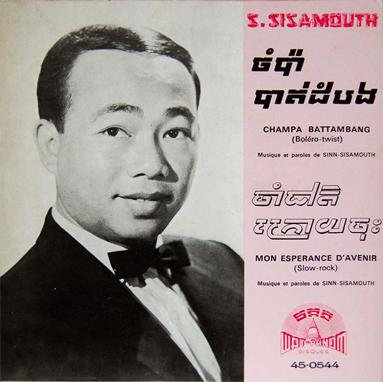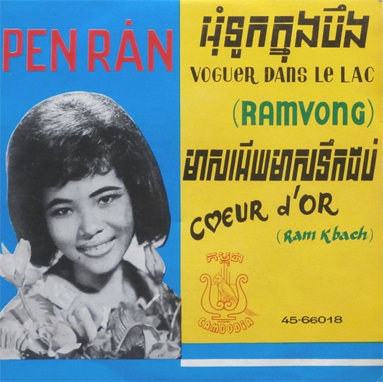
Singing the Khmer
Rouge Blues
It is a sad truth that an entire culture can be completely wiped out. Many find
solace in the fact that museums exist for this very reason, but not every artifact
finds a place within one. Gone are the Sumerians, Harappan, and Inca, but what
of more contemporary cultures, say, wiped out in 20th Century warfare?
In the 1980s, tape traders around the world helped catalog and preserve a nearly
lost music scene, because of this very horror.
While many envision war-torn jungles, or impoverished villages, when they think
of Cambodia, it was actually quite a modernized country by the late 60s. A bit
Western in their ways - due to French Imperialism - there was a thriving music
scene in the capitol of Phnom Penh, with influences from big band jazz, soul,
garage rock, and movie soundtracks, all mixed in with the local elements.
In 1975, the Communist Party of Kampuchea - more commonly known as the Khmer
Rouge - took power. Led by Pol Pot, the group forced all of Cambodia to isolate
itself from foreign influences; closed hospitals, schools, and factories; abolished
banking, and even a formal currency; outlawed religion; confiscated private
property; then relocated urban citizens to forced-labor farms. In a massive
"brain drain", the Khmer Rouge also murdered intellectuals, and subversives,
including musicians and celebrities. They burned or destroyed all forms of media,
new and old: newspapers, cassettes, vinyl, movie reels, television sets, and
radios. It was thought that much of Cambodia's history, dating from 1860 - 1975,
was completely lost.
In 1992, the UN Transitional Authority in Cambodia arrived in the country to
hold peace talks, as well as free elections. Cambodia has since restructured
from its horrible past, and with continued open borders, the flow of information
went back and forth. Thanks to that steady stream, much was rediscovered, and
a lot of it is kick ass music.
Thought to be the "King of Khmer Music", Sinn Sisamouth was born in
1932, the youngest of four siblings. After completing medical school, he became
a protégé of Queen Nearyrath, and was then selected into the classical
ensemble Vong Phleng Preah Reach Troap, which would perform at royal and state
functions. In the mid-50s, he recorded a violin ballad, "Violon Sneha",
and was thrusted into stardom. He followed that with hit after hit, and it is
thought Sisamouth had written over 1000 songs up until the 70s.

After the 1970
coup by the Lon Nol government, Sinn began singing propaganda songs in support
of the Khmer Republic, but once the Khmer Rouge took power, he is thought to
have disappeared into the Killing Fields.
Pan Ron had a minor
Cambodian hit in 1963 with "Pka Kabass", but she didn't become a star
until a duet with Sinn Sisamouth in 1966. Considered by many music journalists
as one of the most versatile singers in music, she swung from jazz to rock with
ease, and from folk to mambo in a breeze.

She was a very
private person, so little is known about her life, but rumors have it that she
met her fate when the Khmer Rouge asked her to play a show, in which they executed
her.
Ros Sereysothea
was born in 1948, as Ros Serey Sothea, growing up poor as one of five children.
Gaining recognition after winning a singing completion in 1963, she changed
her name to Sereysothea, and worked for National Radio. Later that year, she
got her first hit, and was even pronounced the "Queen with the Golden Voice"
by King Norodom Sihanouk.

While producing
a number of Cambodian chart toppers, she made her way into films in the 1970s,
but few of them have currently been found. Like Sisamouth, she later sung patriotic
songs for the Republic, which sealed her fate with Pol Pot's crew.
While most find
the music pretty amazing, the historically dismal affair just keeps repeating
here, with sorrowful stories aplenty.
There is Eng Nary…
…Voa Saroun…
…Yol Aularong…
…and the list
of missing or dead Cambodian artists just keeps going.
Thanks to American tourist Paul Wheeler - who picked up six bootleg tapes while
on vacation there in 1994, and later bootlegged them himself with the help of
NYC label Parallel World (as the Cambodian Rocks LP and CD compilations)
- interest in Cambodian music grew, and may have even saved many of the tracks
above from being lost relics.
On a final note, in October of 2004, the Cambodian National Assembly approved
an agreement with the UN on setting up a tribunal to hold living leaders of
the Khmer Rouge responsible for atrocities committed in the 1970s. Hopefully,
some of this music will get a little more justice.
A. Souto, 2016
BACK TO MUSICA OBSCURA ARTICLE LIST